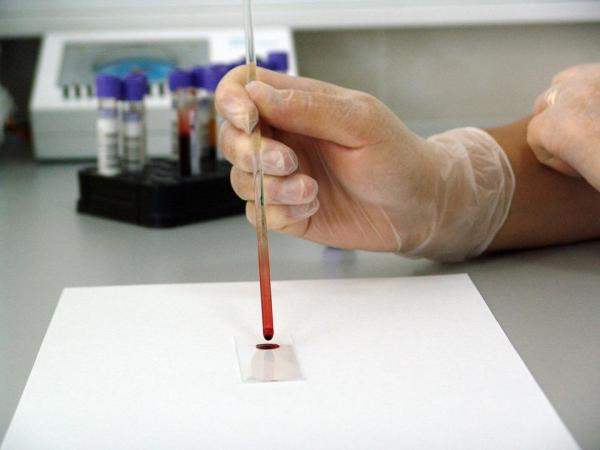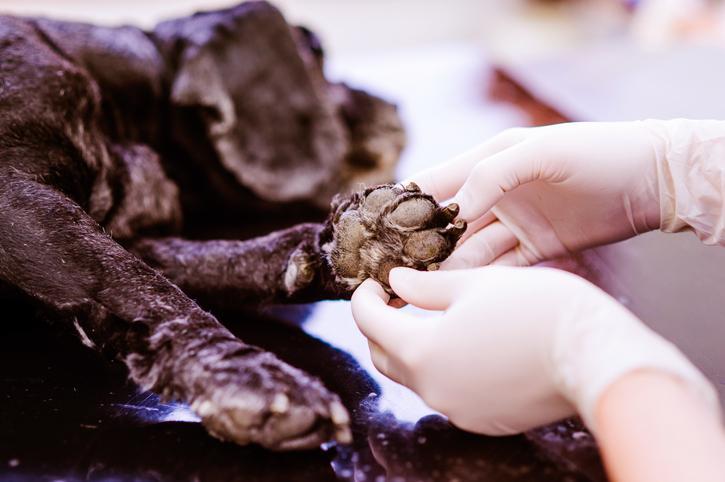Why Does My Dog Have Black Skin?



See files for Dogs
There are different reasons a dog may have black skin, some of which should be concerning. This is the case when it a symptom of an underlying condition. This can be a hormonal imbalance which is causing changes in their physicality and likely their behavior. It is also important to remember that black skin on a dog doesn't necessarily mean there is some pathology as the root cause. Often the reason is much more benign.
The key to understanding why your dog has black skin is taking a comprehensive approach. This means looking at their physical symptoms and psychological well-being to understand what might be the cause. AnimalWised helps you find out what might the problem, if there is one to begin with.
Imagen: www.yelp.com
Hyperpigmentation
The first thing to know about the color of a dog's skin is that it can be a range of colors. If the skin is any color but white, it is known as pigmented. Some of these dog skin colors may be naturally black. They can also be purple, pink or even yellow. The reasons for this are due to genetics, specifically which genes are dominant from the mother or father dog. There may be changes to the fur color over these parts of the skin, but not necessarily.
Hyperpigmentation is when the skin starts to saturate with color, becoming deeper and darker in hue. This often happens naturally over time. When a dog gets older, their skin will become darker. It won't necessarily change color, but if your dog has a pink belly then you will likely see it become darker when they age. It is normal and not something to be concerned about.
There are other causes of hyperpigmentation, some of which are due to a pathology such as pruritus. Pruritus is the scientific term for itching. If you see your dog scratching at themselves regularly and/or excessively, patches of black skin may appear. This is most likely a dermatological condition in dogs which causes irritation.
A skin disease in dogs will be chronic if they are regularly biting and scratching at their skin. This biting and scratching often leads to a blackening of the skin, accompanied by inflammation. The hyperpigmentation will usually occur as part of the healing process. In some cases, this can result in a permanent darkening of the skin.
Hypothyroridism
Another type of black skin disease which may explain a blackening of the skin is canine hypothyroidism. As with hypothyroidism in humans, this is due to a deficiency in the thyroid gland. This gland produces the hormone thyroxine which is involved in the control of metabolism. Dogs with hypothyroidism will have a slower metabolism, something which affects dogs more often from their middle-age onward.
In dogs with hypothyroidism, we can see bilateral and even symmetrical changes in both skin and coat color. Additionally, the hair will not grow as well and there may be patches of alopecia which leave exposed skin. This skin may be dry, thick, inflamed and black. The dog will also gain weight, feel the cold more, stop their heat cycle in females and produce other non-specific symptoms.
Our vet can confirm the disease by producing a blood test. Treatment will require pharmacological treatment. Specifically, they will need daily doses of levothyroxine sodium, a synthetic form of the T4 hormone which can help the body to stabilize itself. The dog's black skin may change with treatment, but some lesions may be permanent.
Endocrine diseases account for around 9% of dermatological consultations in veterinary practices. Hypothyroidism is the most observed endocrine disease in dogs and a common cause of skin blackening[1].

Hyperadrenocorticism
Hyperadrenocorticism is also known as Cushing's disease and it is another explanation for black skin in our dogs. Another glandular condition, in this case it is as a result of overproduction of glucocorticoids by the adrenal glands located in the kidneys. This disorder may also have an exogenous origin as drugs composed of glucocorticoids supplied for long-term treatment may induce the condition.
Endogenous causes are often related to the presence of tumors. The excess glucocorticoids lead to alopecia which follows a symmetrical pattern on both sides of the animal. The skin turns black and there is sagging in the belly. An increase in water intake and urination can also be observed. This affects more middle aged and older dogs. Through analytics, the vet can confirm a diagnosis and prescribe treatment.
There are various causes of Cushing's syndrome in dogs. Determining the underlying cause will directly inform the treatment. As with hypothyroidism, pharmacotherapy may be used to stabilize hormone production. This will likely be required for the remainder of their lives. In cases of tumors on the adrenal glands, treatment will require surgical removal and/or chemotherapy if the tumor is malignant.
Hyperestrogenism
Excess estrogen is another cause of blackened skin in dogs. With this condition, a female dog's ovaries or a male dog's testes overproduce the hormone estrogen. The root cause is often due to the presence of cysts or tumors, neither of which need to be malign. The disorder is known to produce a range of symptoms which are known as feminization. This involves the enlargement of the breast area or the vulva in female dogs.
Additionally, dogs suffering from hyperestrogenism may present with other irregularities. These can include phantom pregnancy, irregularities in the heat period or uterine infections. Regarding the skin and fur, the latter will often fall out revealing blackness in the former. Seborrhea may also present which is a particular type of dermatitis leading to redness in the skin. The veterinarian should investigate the cause of this hormonal overproduction. Often the treatment is sterilization to remove the sex organs and prevent this from occurring.
Other causes of your dog's skin turning dark or black may include yeast infections, different types of dermatitis or even allergies. The best way to determine what is wrong and which treatment plan is required is to seek a veterinary health specialist.
Canine follicular dysplasia (black skin disease)
Commonly known as black skin disease in dogs, canine follicular dysplasia is a disease of genetic origin. Its main symptoms are alopecia and blackening of the skin. There are various different types of black skin disease and the symptoms tend to vary according to breed. For example, Greyhounds are more likely to have pattern baldness on their thigh to reveal black skin underneath.
The loss of hair and darkening of the skin usually occurs around 3 years of age. It is more common in males than females and it is most stark in the Mexican Hairless and Chinese Crested dog breeds. These breeds eventually become almost entirely bald and are noted for their blackened skin.

Other reasons a dog's skin has turned black
Endocrine diseases in dogs commonly manifest in dermatological lesions[2]. When the skin darkens, we can speak of black skin disease in dogs. However, not all causes of skin darkening are endocrine or even pathological in origin. Here we provide some other possible reasons a dog's skin has turned black:
- Burns or trauma: when the dog's skin is subjected to intense heat or a physical trauma, it can result in blackened lesions. This will usually occur once the lesions have started to heal as fresh burns and other wounds will be red and inflamed. You may not have seen the dog sustain the injury, but you can tell by the consistency of the lesion whether burns or trauma have occurred. They usually lighten once healed, but there may be permanent scarring.
- Necrosis: when the skin cells do not receive enough blood, they die. This is known as necrosis and it can have many causes. This can be anything from spider bites to systemic diseases. Necrosis cannot be reversed, but the underlying cause can be treated. If a necrotic lesion occurs, the result will be black skin on the dog.
- Chronic kidney disease: although not common, when the kidney ceases functioning properly, it can resulted in elevated levels of calcium (hypercalcemia). In these cases, lesions known as calcinosis cutis in dogs can occur. These are the same lesions which can result from endocrine diseases, so they can be black. They will begin a light color and darken as the skin hardens.
- Side effect of drugs: certain drugs can cause lesions in the skin which can turn black. This is the case with calcium injections which can cause calcinosis cutis on the injection site.
This article is purely informative. AnimalWised does not have the authority to prescribe any veterinary treatment or create a diagnosis. We invite you to take your pet to the veterinarian if they are suffering from any condition or pain.
If you want to read similar articles to Why Does My Dog Have Black Skin?, we recommend you visit our Skin problems category.
1. Costa, G. M., Araujo, S. I., Xavier Júnior, F., Viana, D., & Evangelista, J. (2016). Dermatological manifestations associated with canine hypothyroidism: A review. Revista Brasileira de Higiene e Sanidade Animal, 10(4), 781-797.
http://dx.doi.org/10.5935/1981-2965.20160064
2. Frank, L. A. (2006). Comparative dermatology--canine endocrine dermatoses. Clinics in dermatology, 24(4), 317–325.
https://doi.org/10.1016/j.clindermatol.2006.04.007








